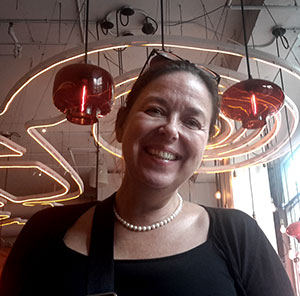Lecture in English – lecturer: Susanne Altmann. The event accompanying the exhibition „CZAS NASZ | UNSERE ZEIT | OUR TIME”
Often, the artistic work with textiles, fabrics or fibres is connected to traditional female domesticity or, at best, categorised as applied arts. Women artists from Eastern and Central Europe such as Magdalena Abakanowicz, Christa Jeitner, Jagoda Buic, Ana Lupaş and Adriena Šimotová defied such assignments of meaning way before 1989. They did so by infusing the sculptural malleability and everydayness of precisely these materials with aggression, pain and uneasiness. The materials they formed in an artistic process attained sculptural autonomy. In the haptic experience of them, a link to clothing always makes itself felt, and with it a link to that anthropological “layer” that ultimately separates or protects the individual’s body from the social space. This presentation will attempt to plea for a responsible reading of Fibre Art pre-1989 and underscore its uniqueness and groundbreaking originality. The research of how this medium developed and of its transgressions from common ideas of a (post)modernist canon has only just begun. It needs a decisive re-evaluation on the grounds of aesthetic and craft-related parameters in addition to the socio-political interpretations that still often overshadow an art historical perspective.

Susanne Altmann is an art historian, based in Dresden. In addition to various curatorial and publishing activities, since 2004 she has been focusing on art production in the former socialist part of Europe before and after 1989. Her research addresses both, the development of a canon and the modes of reception for non-conformist avant-gardes. Increasingly she aims to re-contextualize art that had been created in Eastern Germany. In 2018, her essay about Gabriele Stötzer and the Women Artists’ Group Erfurt was published in the book „All-women art spaces in Europe in the long 1970ies“ (eds. A. Jakubowska & Katy Deepwell) with Liverpool University Press. In 2017, her monographic study of the oeuvre of Magdalena Jetelova came out in Jetelova’s exhibition catalogue at the National Gallery in Prague. Quite recently, she has contributed a study on fibre art in the former communist Europe for a monograph on Magdalena Abakanowicz (Central Museum of Textiles in Lodz, Poland).
Since 2010, Altmann has been teaching German and contemporary art history of the 19th–21st centuries at the Academy of Fine Arts in Dresden (HfBK, DAAD programme in English language). In December 2018, her exhibition “The Medea Insurrection. Radical Women Artists behind the Iron Curtain“ opened at the State Art Collection in Dresden (Albertinum, Kunsthalle Lipsiusbau) which was on display at the Wende Museum of Cold War Culver City, Los Angeles, USA) until April 2020.